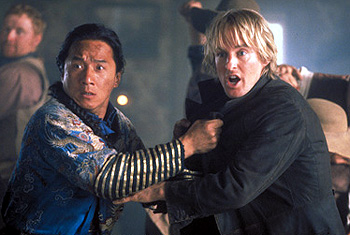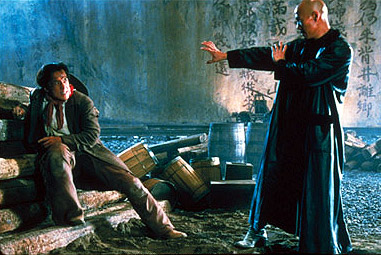

Something funny has been happening to Jackie Chan films. Chan, for years a superstar in Asia, is only a recent phenom here in the United States. As a result, studios simply re-release his older films (Rumble in the Bronx, Supercop), redubbing them and adding contemporary music to reap easy profits. Shanghai Noon is Chan's second United States' produced film, after the humongously successful Rush Hour, which helped to launch the career of Chris Tucker (sequels for Shanghai Noon and Rush Hour are already in the works). All of a sudden, Chan's movies have plots. His Asian films hold together tenuously under paper-thin stories that frequently collapse under any scrutiny. Now, plots make sense, and can actually be followed.
Here, Chan is Chon Wang (yes, it sounds like John Wayne) teams with cowboy Roy O'Bannon (The Haunting, The Minus Man) in much the same way as Chan teamed with Tucker. Wang is the outsider, this time, an Imperial Guardsman from the Forbidden City. He is here to rescue Princess Pei Pei (Lucy Liu, Payback, Play It To the Bone), who is currently being held for ransom in Carson City, Nevada. Liu does an interesting thing here by combining the types of role that define her career. Before her current stardom, she frequented many television dramas as the crying Asian woman. Now, she is the vampy bitch. In Shanghai Noon, she is both. O'Bannon and Wang meet initially when O'Bannon's gang tries to rob the train Wang is riding. After the prerequisite misunderstandings, O'Bannon and Wang team up to rescue the Princess. O'Bannon is brash and confident, and believes that what he knows is correct. He tries to teach Wang everything about being a cowboy and living in the West, when in actuality, O'Bannon has much to learn from Wang.
Jackie Chan movies are never sophisticated. They are made simply for the sheer pleasure of watching Chan and all his typical trademarks. In Shanghai Noon, Chan again uses anything and everything around him as a weapon (from saplings to his hair) in a manner that is surprisingly nonviolent. There is usually a minimal amount of blood in his movies, and most of the violence is slapstick. Chan and Wilson play nicely off each other, with much of the humor in Shanghai Noon arising from the large cultural gap between the two. Wong is the typical Chan character; he is a doofus yet can become deadly serious within the blink of an eye. He always seems lost or dumbfounded by the people and situations around him. He exuberant personality radiates off the screen and into the theaters, making the same formula he uses in every movie work over and over. Plus, he does his own stunts, plays outtakes at the end of the movie, blah blah.
Director Tom Dey and writers Alfred Gough and Miles Millar (Lethal Weapon 4, Made Men) essentially sit back and allow the organized chaos of Chan rise through. They also again redefine the western genre, making a western comedy that actually works. Shanghai Noon also works for Asians the same way Posse did for African Americans - it shows they did indeed live and interact in the Old West. Also, most of the minorities portrayed in the film are not stereotyped excessively, the white man is the butt of many of the jokes. Shanghai Noon may be fairly brainless, but it is very fun to watch.